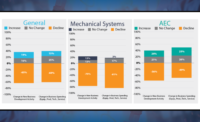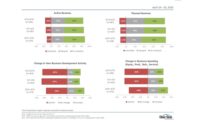Editor's Note: Part one of this survey, conducted March 24-26, is available to view here: https://www.esmagazine.com/articles/100290-coronavirus-survey-56-of-aec-respondents-report-a-decrease-in-new-business-activities.
On March 31, Engineered Systems presented the results of a Clear Seas Research survey that examined how architecture, engineering, and construction (AEC) firms and mechanical systems companies are navigating their way through the coronavirus pandemic. The results, which were collected March 24-26, were eye-opening, as more than 40% of AEC companies shared they intend to temporarily suspend employees (with or without pay) due to the coronavirus. Additionally, 56% report a decrease in new business activities.
Most recently, those numbers have increased to 46% and 61%, respectively.
These updated statistics come courtesy of an updated Clear Seas Research survey. The latest survey, conducted April 2-6, describes exactly how responding AEC firms and mechanical companies’ actions and opinions have evolved since our first survey, conducted March 24-26, and defines their thoughts on the present and future.
As time ticks on, and the COVID-19 pandemic continues to evolve, Engineered Systems remains committed to providing the most up-to-date, pertinent information possible to help facility managers and consulting/specifying engineers manage their operations during this unprecedented time. The quotes included in this article were provided by those completing the survey. We hope you find this study worthwhile.
Primary concerns
A total of 360 AEC companies and 81 mechanical systems representatives responded to the April 2-6 survey.
When asked to identify their biggest areas of concern, 75% of the AEC respondents identified the current state of the economy. This is a 16% increase compared to the initial survey. Sixty-nine percent of respondents identified friends and family becoming infected by COVID-19 as their greatest area of concern, and 68% are primarily concerned with meeting their business goals over the next three months.
“As a self-employed designer and architect, I have never seen things as bad as they are right now,” said one survey respondent. “Even in 2008, clients were still planning projects. I am totally dead in the water and working on ongoing projects with only one new active client over the last two months. Most clients have stopped projects all together for obvious reasons.”
For mechanical systems respondents, 72% identified the current economy, 65% expressed concern regarding business activities over the next six months, and 64% identified business activities over the next three months as their greatest areas of concern.
“Will the great economy of the past ever come back to the way it was before the pandemic?” asked one mechanical systems respondent. “That’s my biggest concern.”
Active and new business
When it comes to active business, 51% of responding AEC firms report they are completing their jobs on schedule, while 35% of projects have been delayed, and 14% of projects have been cancelled. In the first survey, 55% reported they were completing projects on schedule.
Regarding planned business, approximately 48% of AEC companies reported everything was running on schedule — a 5% decrease from the first survey — 39% of projects have been delayed, and 12% of projects have been canceled.
“Because we have health care clients, we have assisted with temporary facilities by modifying existing facilities to accommodate increased patient capacity and needs,” said one respondent.
For mechanical systems respondents, 46% are completing business on schedule — a 6% drop from the first survey — 36% are reporting delayed projects, and 16% have had projects canceled.
Planned business in the mechanical systems’ industry has plummeted, as 41% of responding companies report all business is on schedule — a 12% decrease from the original Clear Seas survey — 46% have experienced delays in planned work, and 13% shared that some of their planned projects have been cancelled.
Unemployment expectations
In the next three months, 62% of AEC firms stated that they intend to lay off employees or temporarily suspend employees. Of that 62%, 24% percent of firms intend to lay off employees, 22% reported plans to temporarily suspend employees with pay, and 16% said they will suspend employees without pay.
For mechanical systems respondents, that number increases to 69%: 38% intend to lay off some employees, 18% plan to temporarily suspend employees without pay, and 13% intend to suspend employees with pay.
Prospective business opportunities
Of the 360 AEC respondents, 67% said they were experiencing declines in new business activity — an 11% increase from the first survey — while only 19% reported increases in new business activity.
“As an engineering educator, there are no challenges, only opportunities,” said one AEC respondent.
A total of 61% of AEC respondents have experienced a decline in new business spending a 12% increase when compared to the first survey.
“We’re purchasing more new technology because, due to this pandemic, we recognize that we need to change some of the type of work that we do,” said one respondent. “There’s a lot of work that requires technology that we do not have, so we need to change that.”
A total of 30% of AEC respondents said they intend to apply for small business stimulus loans, while 21% said their companies qualifies for the loan but they do not intend to seek the assistance.
In the mechanical systems industry, 80% of respondents said they are experiencing a decline in new business activities, and 77% noted a decline in business spending. More than 40% of mechanical systems businesses intend to apply for small business stimulus loans, while 14% qualify for the loan but do not intend to seek the assistance.
Essential Services
In states where lockdown orders exist, AEC firms and mechanical systems companies must obtain “essential” status to continue working.
A total of 63% of AEC respondents said their work is classified as “essential” in their state, while 28% said they were not considered essential, and 9% were unsure.
For mechanical systems companies, 91% noted their companies have been identified as essential
“I work in a satellite office in Pennsylvania, and our firm is headquartered in Maryland,” said one AEC respondent. “Our firm is considered an essential business in Maryland; however, in Pennsylvania, our firm is considered a non-essential business, but I'm still working from home to meet our client deadlines and making it work.”
Another AEC respondent, a land surveyor, is frustrated that he cannot continue working, especially because his job is often done in isolation.
“When doing field work, land surveying work is mostly done while socially distancing,” he said. “However we are not considered essential services, and the professional organizations representing us have really done nothing to influence the president or our governor.”
Health matters
When asked how AEC firms are keeping employees safe, 76% reported they are encouraging hand washing and promoting social distancing, 71% are reducing or eliminating face-to-face meetings, and 63% are providing hand sanitizer and/or antimicrobial soaps for employees.
Mechanical systems respondents ranked their responses accordingly: 84% are encouraging hand washing, 83% are promoting social distancing, and 79% are providing hand sanitizer and/or antibacterial soaps.
“There are many people in the deadly age range in our industry,” said one AEC respondent. “In our company, three people have already died from the COVID-19. We are currently isolated but we do not know how the virus will evolve. It is a pity that there are people who live to work, and this causes resentment about what’s the best thing to do.”
As difficult as it may be, another AEC respondent encourages engineers to simply wait this pandemic out.
“Please stay home until the quarantine ends, because we have no idea about what will happen next,” the respondent said. “Let's all take care of ourselves as a nation and as inhabitants of this land.”
Perhaps one respondent summed it up with a vote of encouragement: “Let’s hope that all businesses will not only survive, but thrive in the future.”
Survey Statistics
The April 2-6 Clear Seas Research study garnered 891 responses across numerous industries, including AEC, mechanical systems, manufacturing, packaging, food and beverage, security and critical systems, and gaming and hospitality.
Regarding demographics of the respondents, 17% reported less than $500,000 in revenue; 10%, $500,000-$1 million; 17%, $1 million to $4.9 million; 8%, $5 million to $9.9 million; 5%, $10 million to $14.9 million; 4%, $15 million to $19.9 million; 4%, $20 million to $24.9 million; 2%, $25 million to $29.9 million; 2%, $30 million to $34 million; 1%, $35 million to $39.9 million; 2%, $40 million to $44.9 million; 1%, $45 million to $49.9 million; 7%, $50 million to $99.9 million; and 21%, $100 million or more.
Further, 26% of respondents noted they employ 10 individuals or less; 14%, 10-25 employees; 9%, 26-50 employees; 9%, 51-100 employees; 11%, 101-250 employees; 7%, 251-500 employees; 5%, 501-1,000 employees; 3%, 2,501-5,000; 4%, 5,001-10,000 employees; and 8%, 10,000 or more employees.
A total of 31% of respondents are from the Midwest; 27%, the South; 22%, the West; and 20%, the Northwest.
To download the comprehensive survey, click here; to download the AEC portion of the study, click here; and to download the mechanical systems survey, click here.





